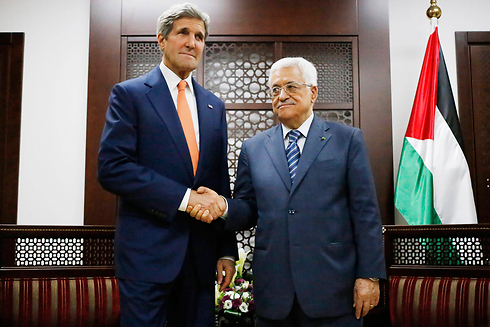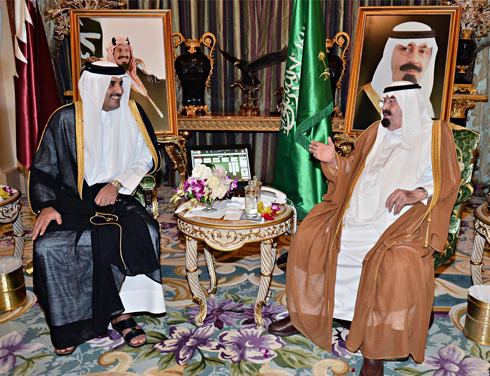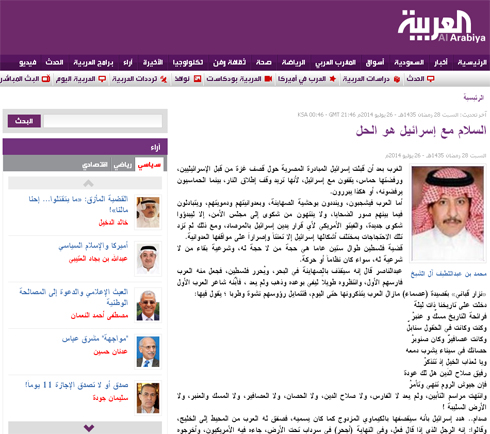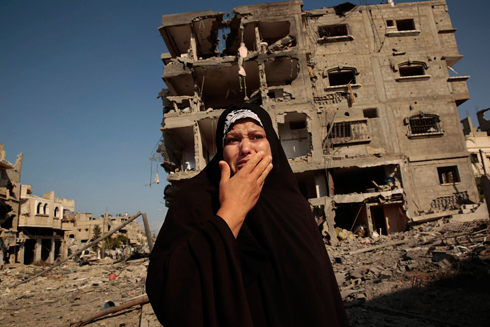Yet the al-Arabiya network has chosen to publish a surprising article titled, "Peace with Israel is the solution," by Saudi columnist Mohammed al-Sheikh.
The writer's family is extremely influential in Saudi Arabia, and its roots go back to the Wahabbi family which founded the kingdom.
Why was the article published in Saudi Arabia and why now?
The Saudi initiative
The Saudi peace initiative is not new. In 2002, and then again in 2007, Saudi King Abdullah made a comprehensive peace proposal on behalf of the Arab League, which included the recognition of Israel and full normalization with the League's member states in exchange for an Israeli return to the 1967, an acceptable solution for the Palestinian refugees and the establishment of a Palestinian state with East Jerusalem as its capital.
The Saudi proposal aims to complete the reconciliation process with the Sunni axis in the Muslim world, which began with the Israel-Egypt peace treaty in 1979 and continued with the Oslo Agreements in the early 1990s, the peace treaty with Jordan in 1994 and different levels of diplomatic relations with Morocco, Qatar and Mauritania, which are all Sunni countries.
The Saudi 'peace camp'
Mohammed al-Sheikh published an article in a Saudi newspaper and in the al-Arabiya network last week, calling for peace with Israel. He explained that only peace would give the Palestinians an independent state and stop the war, in which Israel has an absolute advantage.
The writer reviewed the recent decades in which leaders in the Arab world had promised to save the Palestinians and destroy Israel: Gamal Abdel Nasser, the legendary Egyptian leader, who promised to be a reincarnation of Sultan Salah ad-Din and failed in 1967; the pathetic Saddam Hussein, who threatened to wipe Israel off the map with chemical weapons and missiles, and ended his life hanging on a rope; Hafez Assad, the Syrian leader who promised to free Palestine yet maintained 30 years of calm on the Israel border, failed too; and so did his son Bashar, who has been fighting his own people instead of liberating the Golan Heights.
Al-Sheikh goes on to talk about the revolutionary Iran, which has been promising since 1979 to wipe the "little Satan" off the map; Hassan Nasrallah, the "Shiite knight in Lebanon," who went out to fight the Syrian people instead of Israel; the Muslim Brotherhood and Hamas, which sacrificed the Palestinians for the false dream of liberating "the Islamic Waqf of Palestine," the holy land that cannot be negotiated. And now the Hamas organization is refusing to accept the Egyptian ceasefire initiative.
Several weeks ago, a Saudi intellectual named Abdullah Hamid al-Din wrote in the London-based Arabic-language al-Hayat newspaper that the best battle against Israel would be peace, and that it could not be defeated through force in the foreseeable future.
According to Hamid, since 1947 the Palestinians have been repeatedly missing opportunities to compromise. In the meantime, he says, Israel is developing and growing stronger while the Palestinians are growing weaker and their territory is diminishing.
Hamid argues that many of the Palestinians' demands are unrealistic, like the demand to return the Palestinian refugees, which he compares to the return of the Indians to US cities.
Commentator Bader al-Rashed also wrote in al-Hayat in December 2013 that the Arabs must wake up from the false dream of destroying Israel and that "its existence is an established fact that we must come to terms with."
According to al-Rashed, those who say that Israel's hand is extended in peace and that the Arabs are refusing are wrong. On the contrary, he says, Israel is doing everything to thwart the Arab peace initiative.
Why peace now?
The Saudi kingdom, which was built based on a fundamentalist Wahabbi ideology, has undergone modernization and moderation processes following its relations with the United States and the West and the money it made from oil.
On the educational level, however, Saudi Arabia remains a dark, fanatic country whose constitution is based on the Sharia according to the Hanbali school, the most radical school in the Sunni world.
The growing power of the Shiite axis is threatening the kingdom and its Sunni allies. After 1,300 years of Muslim history in which the Sunnis controlled the Shiites, this balance is about to change.
The Shiite axis of Iran, Iraq (the al-Maliki government, Syria (the Alawites) and Lebanon (Hezbollah) is maintaining its strength. In addition, the Shiite-Zaydi tribes of the Khotis in Yemen are threatening the Saudi Arabia's huge southern border and are also supported by Iran. The worst threat to the Saudis is the Iranian nuclear race which could destroy them.

Apart from the Shiite threat, for more than two decades now Saudi Arabia has also been fighting the Muslim Brotherhood movement, which betrayed the kingdom that funded it for decades, and now supports Egyptian President Abdel Fattah al-Sisi's battle against them. In addition, the ISIS organization is gaining strength in Iraq and threatening Saudi Arabia's northern border.
As the terror and Shiites grow stronger, the Sunni world is divided into two axes: Turkey-Qatar and Egypt-Saudi Arabia. This split was evident in the Gaza crisis when Turkey and Qatar encouraged Hamas to reject the Egyptian ceasefire proposal.
Shared interests
Saudi Arabia is well aware of Israel's political, economic and social stability, its restraint in light of the turmoil in the Arab world, its power against Hamas and its impressive technological abilities in the war on terror, especially the Iron Dome system in the present, and the war on the terror tunnels in the future.Saudi Arabia is interested in ending the "small conflict" between Israel and the Palestinians in order to have Israel on its side in the "big conflict" against the Shiite world and the growing Sunni terror threat.
Today Israel and Saudi Arabia have more shared interest than ever, including a struggle to stop the Iranian nuclear program, a war against the Muslim Brotherhood movement and its affiliates (Hamas), support for the al-Sisi regime in Egypt, maintaining the stability of the Jordanian kingdom, standing against the Assad regime in Syria and Hezbollah in Lebanon, a war on al-Qaeda – and the list goes on.
Dr. Yaron Friedman, Ynet's commentator on the Arab world, is a graduate of the Sorbonne. He teaches Arabic and lectures about Islam at the Technion, at Beit Hagefen and at the Galilee Academic College. His book, "The Nusayri Alawis: An Introduction to the Religion, History and Identity of the Leading Minority in Syria," was published in 2010 by Brill-Leiden.




















